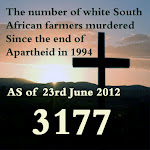[Previously, at WEJB/NSU:
"New York Times Columnist Charles Blow: Die, Whitey, Die!"]
What's wrong with America having Anglo-Saxon heritage?
By Ed West
Last updated: July 26th, 2012
The Telegraph
623 Comments
Mitt Romney has distanced himself from the comments made by an adviser, who told this paper that “We are part of an Anglo-Saxon heritage, and he feels that the special relationship is special.”
Such was the scale of the outrage that even the vice president was moved to criticise the comments, calling them "beneath a presidential campaign", while various lesser Democrat supporters described it as dog-whistle racism or historical absurdity.
Many of the jokes seem to concern the irrelevance of mentioning an early medieval barbarian people, but what upset people was that Anglo-Saxon seems synonymous with White Anglo-Saxon Protestant or just “white”. In England the term has less of a dog-whistley sound, meaning simply of English heritage, whether by blood or political tradition. Describing America as such does not seem especially strange, and to get angry at an assertion is vaguely insulting to us.
In the States the meaning of Anglo has evolved as various waves of people were assimilated. The term was first used to distinguish Protestant Americans of largely British (though also Dutch and German) stock from Irish Catholic immigrants, many of the former emphasising their Englishness in reaction to the newcomers. In the early twentieth century it was sometimes used by American leaders who felt a bond with Britain, such as Woodrow Wilson, especially when that country was in conflict with Germany. But later Anglo-Saxon (and Wasp) came to mean people of north-west European Protestant ancestry, as opposed to the immigrants of the 1880-1920 wave, Catholics and Jews from south and east Europe. Nowadays it can mean all “non-Hispanic whites”.
By that definition the implications of Romney’s adviser could be “we are white, Obama isn’t”. But if this was dog-whistle racism, then Obama’s 2008 campaign was a blaring Klaxon horn of race. Forget the “post-racial candidate” (© the entire mainstream US and European media), Obama was in reality the “multi-racial” candidate, one who signified the end of white demographic dominance. That’s post-racial in the sense that the majority are becoming a minority, but it would be absurd to pretend that race was not a huge factor in the election of this not-very-experienced junior senator – illustrated by the fact that 96 per cent of African-Americans voted for him.
Obama’s underlining foreign policy narrative was that, being half-Kenyan and with an emotional attachment to people of colour, he would be able to form a better rapport with Africans, Arabs and the rest of the non-white world. But if that’s the argument, then logically Mitt Romney, who’s not just white but the whitest man in the world, will have the same appeal to Europeans. If non-whites are so basic and ethnocentric that it takes one of their own to make them see America kindly, isn’t it the same for everyone? And the fact is that, in his foreign policy, Obama has had a very cool attitude to Britain, which tends to suggest that the changing demographics of the US will influence its foreign-policy direction.
America’s vast contradictions and hypocrisies concerning race still rest on the idea that some groups are supposed to be post-racial, while others are encouraged to celebrate their identity, and to fight for the interests of their group. For example, lots of self-appointed Hispanic leaders want America to be more Hispanic, to have more of their countrymen. No one in the media accuses them of racism or chauvinism, and instead presents people wishing to maintain the status quo as hatemongers. Yet why is it necessarily more wrong for Anglo-Americans to want the country to be more full of people like them? Some people advancing the interests of their group are racists; some people advancing the interests of their group are anti-racists.
And why is it acceptable for every ethnicity in America to take pride in its roots, apart from the ethnic group that founded the 13 colonies, bequeathed it their language and laws, and established the political philosophy and liberal institutions? Even if actual English blood accounts for less than 10 per cent of American DNA, the Anglo political identity of America is deep. As David Hackett Fischer pointed out in Albion’s Seed, the cultural influence of the initial founders of a society can vastly outweigh their genetic input.
Among the many English-Americans were almost all of America’s founding fathers, including its greatest, Thomas Jefferson, who used the Anglo-Saxons as a political model, and often (like many Whigs and proto-Whigs before) saw the conflict within the British world as one between latter-day Normans (Tories) and Saxons (Whigs). Jefferson even traced the English (and so American) tradition of representative government back not just to the Anglo-Saxon Witenagemot but to the forest councils of the Saxons on the continent (one of the many popular pseudo-historical ideas that sprung out of the Teutomania that followed the rediscovery of Tacitus in the 16th century). He was so obsessed with the idea that he even learned some Old English.
It is only in recent times, many years after the 1965 Immigration and Nationality Act made America a truly diverse society, that making such a statement has stopped being a bland statement of historical fact and become a virtual hate crime. The perverse thing about the white liberal view on race is that it stems from an underlying belief that whites are morally superior beings because they, alone, can and should think beyond such primitive attachments. But as “Anglo-Saxons” become a minority in the US, their voting patterns increasingly resemble those of minorities, who traditionally vote in blocs. In which case maybe this "gaffe" won't hurt Romney that much, after all.
Ed West is a journalist and social commentator who specialises in politics, religion and low culture. He is @edwestonline on Twitter.


No comments:
Post a Comment